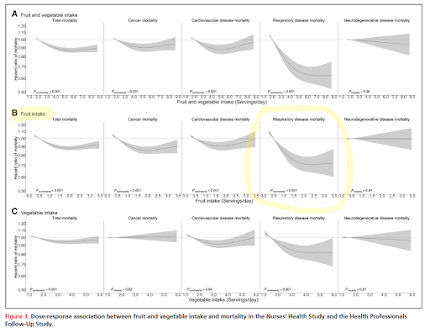Fruit and Vegetable Consumption Associated with Reduced Mortality / Respiratory Diseases and Aquaporins, ENaC & PON1

The eat 'five a day' (referring to servings of fruits and vegetables) recommendation of the World Health Organization and many national health agencies has new support based on findings by Wang et al. (2021) from the Nurses' Health Study and the Health Professionals Follow-up Study. - link to open access article: https://www.ahajournals.org/doi/pdf/10.1161/CIRCULATIONAHA.120.048996 The study found a reduction in all-cause mortality as well as reductions in mortality due to respiratory diseases, cardiovascular disease and cancer. The thresholds for reductions in mortality were achieved at two servings of fruit and three servings of vegetables per day. No additional benefit was seen for over five servings. Sadly, there was no significant reduction found for neurodegenerative diseases (but see the Michley et al. (2017, open access) study on Parkinson disease re: fresh vs. canned/frozen). Wang et al. (2021) Above is Figure 1 from Wang et al. (2021); it is quite small and th...